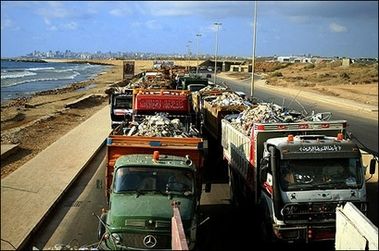 Source: WFP, Municipal workers have distributed food rations from the WFP to vulnerable families in Beirut
Source: WFP, Municipal workers have distributed food rations from the WFP to vulnerable families in Beirut
Hundreds of people were killed and tens of thousands fled as bombs hit densely populated neighbourhoods.
Mounds of rubble
Some streets remain intact but, in places, mounds of concrete and rubble are all that remain of 10-storey apartment blocks. In the debris are the remains of people’s belongings – broken furniture, twisted kitchen appliances and pieces of clothing. Bulldozers and dump trucks are, however, hard at work, clearing the narrow streets to allow greater access.
Despite the devastation, tens of thousands of people have ventured back in the last two weeks of peace and, where possible, are settling back into their homes.
“I’m heartened to see people who have been through so much returning to their neighbourhoods,” said Naila Sabra, WFP Regional Director for the Middle East, Central Asia and Eastern Europe, after a recent visit to Haret Hreik.
“These people who rushed back to their areas only to find their homes destroyed or badly damaged need shelter, water, food in the short-term. WFP is providing the food and helping ensure other humanitarian assistance reaches them by transporting it into and within Lebanon.”
Long-term reconstrution
“With the ceasefire and the help of our generous donors, aid is reaching more and more people every day. But we are going to have to provide more assistance in the weeks ahead until the most vulnerable have their daily needs met and the focus turns to longer-term reconstruction,” Sabra added.
Since the start of its emergency operation in Lebanon on 23 July, WFP food has reached some 570,000 people in Lebanon plus 150,000 displaced Lebanese in Syria before they returned home to Lebanon – for a total of 720,000 people.
Most received a two-week ration either in the place where they sought refuge during the fighting or following their return to their home areas.
Increased deliveries
Relative peace since August 14 has allowed WFP to rapidly increase food deliveries to the hardest-hit villages and towns in southern Lebanon despite destroyed roads and bridges.
To date, WFP has dispatched more than 2,700 tons of food in Lebanon in the two and a half weeks since the cessation of hostilities – compared with 1,495 tons in the three-week period leading up to the ceasefire.
WFP is currently revising downwards its three-month US$21 million Emergency Operation to provide food for 500,000 displaced people in Lebanon because most have returned to their home areas.
For the same reason, it is also revising its US$37 million Special Operation for Logistics serving all UN agencies and their partners.
Contact usDavid Orr
WFP/Beirut
Mob +961-70973964
Mob. +963-98-4044-83
david.orr@wfp.org
WFP/Cairo,
Tel. +20-2-5281730
Mob. +20-122455769
mia.turner@wfp.org
Christiane Berthiaume
WFP/Geneva
Tel. +41-22-9178564
Cell. +41-792857304
christiane.berthiaume
@wfp.org
Ellen Gustafson
WFP/New York
Tel. +1-917 367 5070
Mob. +1917 6171276
gustafsone@un.org
Greg Barrow
WFP/London
Tel. +44 207 240 9001
Cell. +44-7968008474
greg.barrow@wfp.org
Cécile Sportis
WFP/Paris
Tel. +33-1-4331-4660
Cell. +33-6161-68266
cecile.sportis@wfp.org



